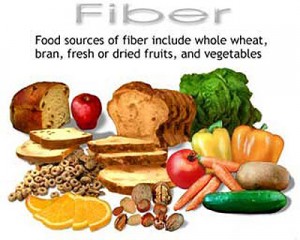 We all hear that fiber is good for you yet many American's don't get enough of it in their diets. Experts recommend that men get about 38 grams of fiber a day and women get about 25 grams. Unfortunately, the average intake in the United States is only 14 grams a day.
We all hear that fiber is good for you yet many American's don't get enough of it in their diets. Experts recommend that men get about 38 grams of fiber a day and women get about 25 grams. Unfortunately, the average intake in the United States is only 14 grams a day.
Dietary fiber is found in fruits, vegetables, nuts and whole grains. It is often referred to as "bulk" or "roughage" and it helps with digestion and it passes through the digestive system relatively unchanged. Besides helping relieve constipation and other bowel problems, high fiber diets have been shown to help with weight loss and reduce the risk of cardiovascular disease, diabetes and certain cancers.
Different types of fiber affect your health in different ways. There are two types of fiber: soluble and insoluble. Soluble fiber may help lower blood sugar and cholesterol and it is found in oat bran, beans, peas, and most fruits. Insoluble fiber is most used to treat GI conditions like diverticulosis, and is found in wheat bran and some vegetables.
Store shelves are filled with fiber-fortified products including yogurt, juices, etc. Added fibers, like those in these products, are "isolated" fibers, such as inulin and maltodextrin and are listed among the ingredients. Research suggests that these isolated fibers may not be as beneficial as those found naturally in foods. However, most experts say the type of fiber you eat is less important than making sure you eat enough!
To learn more about fiber, check out a recent publication from the NIH.

Comments